Human Resources
UofL actively seeks to be a truly Great Place to Work, where faculty and staff are treated fairly, given a voice in governance, and encouraged to get actively involved in making the University a place of ever greater health, wellness, and sustainability.
Professional Development and Training in Sustainability
-
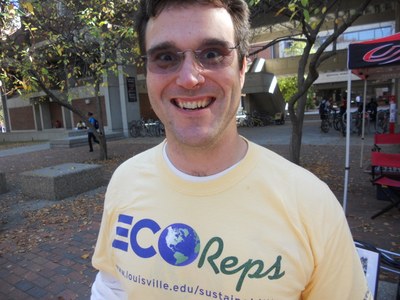 Free online and in-personsustainability training tailored to the unique conditions at UofL and in our community is available year-round through the UofL EcoReps Program. The Sustainability Council launched this program in Fall 2012 to provide in-depth campus sustainability training for all students, faculty, and staff. Participants are encouraged to translate their training into leadership by becoming a point-person and peer-to-peer mentor about sustainability in their building, department, club, residence hall, or other sub-community on campus. Interested persons should contact Brian Barnes <brian.barnes (at) louisville.edu>. More details here.
Free online and in-personsustainability training tailored to the unique conditions at UofL and in our community is available year-round through the UofL EcoReps Program. The Sustainability Council launched this program in Fall 2012 to provide in-depth campus sustainability training for all students, faculty, and staff. Participants are encouraged to translate their training into leadership by becoming a point-person and peer-to-peer mentor about sustainability in their building, department, club, residence hall, or other sub-community on campus. Interested persons should contact Brian Barnes <brian.barnes (at) louisville.edu>. More details here.
-
Sustainability Learning Cafes for all UofL Employees
In 2021, UofL's Sustainability Council launched a new partnership with the Employee Success Center to offer a free Learning Cafe training each semester for all UofL staff who are interested in exploring sustainability practices that can save money, minimize our environmental footprint, empower people to take ownership of space, and build community. If you've always wondered what you can do to live more lightly on the Earth and to center social, economic, and environmental stewardship in your day-to-day work, then this is for you! We offer at least one Sustainability-focused Learning Cafe per semester:
- Spring 2022: Earth Day Learning Café: Yes in my Backyard! Awesome ideas from Bernheim for you to try at home! (Watch Recording.) Facilitated by Bernheim Arboretum & Research Forest’s Director of Education, Kristin Faurest, and UofL Assistant Director of Composition, Cooper Day.
Facilitated by Bernheim Arboretum & Research Forest’s Director of Education, Kristin Faurest, and UofL Assistant Director of Composition, Cooper Day.
- Fall 2021: Sustainability Learning Café: Ethical Purchasing(watch recording.)
Facilitated by: Amber Horn, Assistant Director, Contract Administration; Henry Cunningham, Director of Community Engagement; Tom Walton, Executive In Residence at UofL’s School of Public Health and Information Sciences; Ariana Levinson, Professor of Law; Justin Mog, Assistant to the Provost for Sustainability Initiatives.
- Spring 2021: We launched this partnership on Earth Day 2021 with a Learning Cafe entitled Explore Five Domains to Living Green While Working Remotely (watch recording), focused on sustainability concepts and practices related to: food, transportation, conservation, zero waste, and closing the loop. This training was facilitated by UofL's Assistant to the Provost for Sustainability Initiatives, Dr. Justin Mog, UofL EcoReps Director, Dr. Brian Barnes, and Delphi Center Sr. Associate Director, Dr. Patty Payette. -
HRtalks Wellness Workshops for Sustainability
In 2021, UofL's Sustainability Council launched a new partnership with UofL's employee wellness program, Get Healthy Now, to offer HR Wellness Workshops that focus on sustainable life choices that also contribute to personal health. Workshops have included:
- Oct. 2021: HRtalks Wellness Workshop: Plant-Based Diets (watch recording)
- Aug. 2021: HRtalks Wellness Workshop: Active Transportation (watch recording)
- Aug. 2021: HRtalks wellness workshop: Simple steps to going green (Video recording) -
LinkedIn Learning for Sustainability
In 2021, UofL announced a new partnership with LinkedIn Learning, an award-winning online training resource that is now available to all current staff, faculty and students at no cost. LinkedIn Learning has a digital library of over 16,000 free training courses designed to refine and develop your professional skills, help you learn new software and allow you to explore other areas as you plan for your career growth and personal development. Some of the training courses you can watch are as short as four minutes. Explore the trainings here. LinkedIn Learning offers dozens of courses, videos, and learning paths on the topic of sustainability, such as:- Sustainability Strategies
- Understanding the basics of sustainability
- The Employee's Guide to Sustainability
- Navigating Environmental Sustainability: A Guide for Leaders
- Communicate around sustainability and climate issues internally
- Become a sustainability champion
- Increasing demand for sustainability
- Introduction to LEED Certification
- Learning Design for Sustainability
- Stay Ahead in Sustainability and Green Building
- The sustainable development goals
- Creating sustainable supply chains
- Create sustainable products and services
- Creating a product from a sustainable material
- Overview of Triple E model for sustainable change
- Paper and sustainability
- Choose sustainable seafood
- Find your sustainable commute option
Sustainability in New Employee Orientation
- From July 2009 to April 2016, every Monday’s day-long New Employee Orientation (required for all full-time university employees) included a module on sustainability at UofL and the Partnership for a Green City. When the program was cut to a half-day, this in-person training was dropped, but all new employees are still given information in their welcome packet about sustainability at UofL. All are encouraged to sign the Cards Go Green! Pledge, committing to at least three actions to reduce their environmental impact; and encouraged to look for ways they can help the University enhance its sustainability as they settle into their new positions.
- In January 2022, UofL's Employee Success Center launched a return to the day-long weekly New Employee Orientation program combined with a year-long onboarding process to provide support for new employees throughout their first year. The new one-day program includes basic information about sustainable choices on campus, including lower-impact transportation and dining options. Sustainability stops are also included in the New Employee Orientation tour. The welcome packet is now paperless and still includes the Cards Go Green! Pledge. During the program, the expectation is set that new employees will attend follow-up trainings and in 2022 we began offering a monthly "Sustainability 101" training geared towards new employees.
- Sustainability information is also distributed during July’s New Faculty Orientations, including the Cards Go Green! Pledge and details about specific projects faculty and students can get involved in to help transform UofL into a living laboratory for sustainability.
Employee Health & Wellness
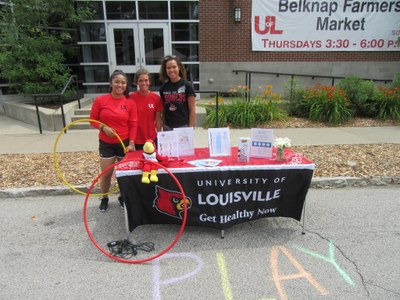 UofL’s Get Healthy Now Program wins Worksite Wellness Award (UofL News, May 25, 2023)
UofL’s Get Healthy Now Program wins Worksite Wellness Award (UofL News, May 25, 2023)- Our Get Healthy Now (GHN) program promotes university-wide wellness through a wide variety of initiatives. GHN regularly celebrates the successes of UofL employees and secures awards & recognition for the University in many capacities. UofL's employee health and wellness programs have been winning awards since at least 2010, when UofL was honored as Louisville’s Healthiest Employer in the 5,000+ employee category and received an award for being the Most Physically Active Worksite. More recently, UofL's Get Healthy Now program was awarded the Silver Worksite Wellness Award at the Worksite Wellness Council of Louisville’s 2023 conference. The award is based on the Centers for Disease Control and Prevention Worksite Health Scorecard.
- University of Louisville has been officially smoke-free on all three of our campuses since November 18th, 2010. In 2017, UofL expanded the policy in scope and area to include all tobacco and vaping products, as follows:
Tobacco and Vaporizing Products Policy
This policy applies to the University Community (administrators, faculty, staff, and students) and all visitors, including contractors and event attendees.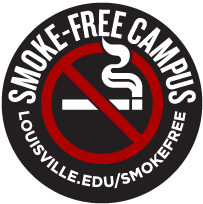 The University desires to provide a healthy working and learning environment for its employees and students. The use of tobacco products shall be prohibited everywhere on all campuses, inside buildings and throughout the grounds on all property owned or leased by UofL. The use of tobacco is prohibited inside any vehicle owned or leased by the university at all times and in all locations; as well as inside any privately-owned vehicle located on university property. For the purpose of this policy:
The University desires to provide a healthy working and learning environment for its employees and students. The use of tobacco products shall be prohibited everywhere on all campuses, inside buildings and throughout the grounds on all property owned or leased by UofL. The use of tobacco is prohibited inside any vehicle owned or leased by the university at all times and in all locations; as well as inside any privately-owned vehicle located on university property. For the purpose of this policy:
Tobacco refers to any and all tobacco products, whether inhaled or ingested, as well as electronic cigarettes and vaporizers.
Tobacco products include the use of cigarettes, e-cigarettes, cigars, pipes, smokeless tobacco, vaporizers, hookahs, and similar type products. - Learn more about our programs and offerings.Up-to-date information can always be found on the GHN website and via Facebook and Twitter.
- In 2012, as a direct result of UofL's Train-the-Trainers Program, funded by a Paula Nye Memorial Education Grant from the Kentucky Bicycle and Bikeway Commission, Get Healthy Now offered Safe Cycling Classes for all UofL employees and participants in the Get Healthy Now program:
Location: Crawford Gym, Room 15 April 3 - May 8, 2012: Fridays, 11:00 a.m.
April 3 - May 8, 2012: Fridays, 11:00 a.m.
July 6 - August 10, 2012: Wednesdays, 2:00 p.m.
August 2 - November 6, 2012: Thursdays, 12:00 p.m.
The class was designed as a guide to various aspects of safety, such as basic equipment maintenance, skills, and rules of the road. The content was based on the League of American Bicyclists' national BikeEd program. This central idea of this class was "Cyclists fare best when they act and are treated as drivers of vehicles." Safe Cycling was intended to help you to become a cyclist who rides with greater safety and confidence. Get Healthy Now encourages participants to ride bicycles for fun, fitness, and transportation, leading to a happier and healthier person, planet, and safer environment for all.
These new bike safety classes were made possible by funds generated through the purchase of "Share the Road" license plates by Kentucky motorists!
Living Wages
In November 2013, UofL became the first public Kentucky university to establish a living wage when it increased its minimum salary for regular status staff employees from $8.67 to $10 per hour. More than 150 employees benefited from the salary increase, which represented a 15% raise for our lowest paid employees.
In February 2014, former Provost Shirley Willihnganz approved a proposal to increase UofL's minimum wage by 25 cents per hour per year for the following four years, starting July 2014 and continuing through 2017 – bringing the rate to $11 per hour by July 2017.
In June 2022, UofL's Board of Trustees approved a budget that allowed for a 2.5% salary increase for most faculty and staff effective July 1st; and an increase of the minimum starting wage to $14.75 per hour, with efforts to grow it to $15 per hour by Jan. 1, 2023. Implementation of the $15/hour minimum wage was delayed until July 1, 2023.
Defined as the minimum hourly pay necessary for employees to afford the average cost of living in their community, including housing, food and transportation, the living wage varies by location. Employees earning the minimum will be eligible for additional compensation if, in a given year, the university’s total salary pool for the year exceeds the living wage adjustment for that year.
In accordance with AASHE STARS, we use the Living Wage Calculator developed by MIT to benchmark the Living Wages and Typical Expenses for workers in Jefferson County, KY. The Living Wage shown is the hourly rate that an individual must earn to support their family, if they are the sole provider and are working full-time (2080 hours per year). All values are per adult in a family unless otherwise noted.
"The first public university in Kentucky to implement a living wage, UofL once again is leading the way among higher education institutions. We have been the leader in implementing Kentucky’s higher education reform. We were the first to develop diversity plans, the first to provide health insurance to domestic partners, the first to follow the minority and female hiring practices of the Louisville Arena Authority and the first to partner with our local public schools and Simmons College of Kentucky to address education gaps by developing a meaningful clinical model of teacher education. The establishment of a living wage is just another reason it’s great to be a Louisville Cardinal."
- Former President James Ramsey, Nov. 8, 2013
Equitable Compensation
"Competitive compensation to university employees is an important priority in the University of the 21st Century Initiative. Over the past several months, many groups within the university have worked to establish an equitable compensation plan to distribute funds set aside for this purpose. The priority for both staff and faculty adjustments has been to bring employees who are furthest behind their respective market salary closer to the market.
Funding in the amount of $2 million, plus additional dollars to pay salary-related benefits such as retirement contributions, is included in this year’s budget to address salary equity. The funding will be split evenly between faculty and staff. Beginning January 2017, adjustments will appear in the paychecks of those affected. These adjustments reflect a continuing and recurring commitment on the part of the university. Below is a summary of the process followed to determine equity adjustments.
Staff Equity Adjustments
Human Resources completed a staff salary survey in early 2016. High quality, reliable data sources were utilized to do a competitive market analysis. This work allowed HR to identify market reference points for over 98 percent of our staff positions. In consultation with the Staff Senate Executive Committee, HR developed a plan that brings the compensation of all staff to at least 81 percent of the market reference point for their position. Just over 10 percent of staff - 399 employees - are affected, and the average salary increase is $2,469. Active employees who began on or before June 30, 2016 and who received a satisfactory or better performance review are eligible.
Faculty Equity Adjustments
The Office of Institutional Research and Planning conducted an analysis comparing faculty salaries with those at a peer group that included Atlantic Coast Conference public universities and institutions designated as benchmarks by the Kentucky Council on Postsecondary Education who participated in Oklahoma State University’s (OSU) annual faculty salary survey. The OSU survey was the source of benchmark salary information, with the exception of Libraries faculty, for whom a different data source was used. Faculty in School of Medicine clinical departments were not included in the survey. After input from faculty and deans, the provost’s office, Institutional Research and the Vice Provost for Faculty Affairs developed a compensation model that took into account a faculty member’s academic discipline, academic rank, time in rank, highest degree earned and current salary relative to that individual’s respective benchmark median salary. The provost’s office used calculations from the model to determine the amount of money available for distribution in each unit. Deans then had the option of allocating funds based on other considerations - including productivity - and/or according to unit rules for salary adjustments. A total of 409 faculty are affected, and the mean salary increase is $2,445. To be eligible, a faculty member must have received satisfactory annual performance reviews in each of the last 3 years and a satisfactory periodic career review, if the latter is applicable.
The Board of Trustees has supported this initiative and the university is committed to continuing these adjustments to bring the salaries of university employees closer to their market rates."
- Acting President Neville Pinto, January 18, 2017
Living Wages for Contract Workers
The Living Wage policy adopted in 2013 did not apply to people who work on campus for contractors like food services, the UofL Bookstore, and certain custodial, security and printing services. The Sustainability Council advocated for the extension of the policy to all contract workers as well, and in fall 2015, the student group Cards United Against Sweatshops joined the struggle: Cards United Against Sweatshops meets with UofL administration to demand raising the minimum wage for all contract workers to $10.10/hour (The Louisville Cardinal, Oct. 12, 2015).
Success came in December 2015, when UofL announced that the living wage policy has been extended to all full-time contract workers at the university. UofL officials approved a requirement that companies entering contracts with the university must pay their full-time staff a minimum wage of at least $10.10 per hour. Companies currently doing business with the university will be required to meet the new guidelines when their agreements are renewed. The new policy matched one implemented by the commonwealth’s executive branch in summer 2015 that mandates the higher minimum wage for many state government workers and for employees of companies doing business with the state. Universities were excluded from that policy.
“Full-time contract employees are vital to the success of many operations around the university. Establishing this policy will ensure they can meet their basic life needs and will help our contractors attract and keep outstanding employees. In short, this is simply the right thing to do.”
- Harlan Sands, Former Senior Vice President for Finance and Administration, Dec. 16, 2015
Childcare
The 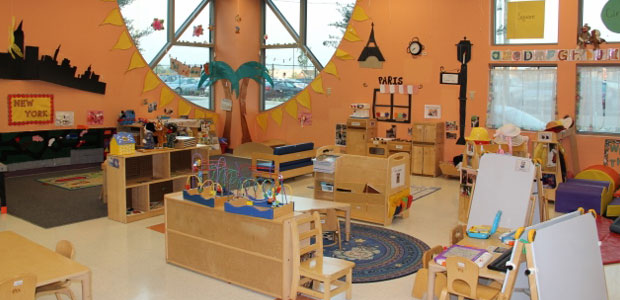 Early Learning Campus (ELC) is part of the Gladys and Lewis "Sonny" Bass Louisville Scholar House Campus and is an exemplary pre-school for children of UofL faculty, staff and students, and residents of the Louisville Scholar House. The facility offers extended day opportunities for children aged six weeks to four years.
Early Learning Campus (ELC) is part of the Gladys and Lewis "Sonny" Bass Louisville Scholar House Campus and is an exemplary pre-school for children of UofL faculty, staff and students, and residents of the Louisville Scholar House. The facility offers extended day opportunities for children aged six weeks to four years.
The ELC is located at the corner of 5th and Bloom Streets, across the street from the northwest corner of UofL's Belknap Campus. Hours of operation are 7 a.m. - 6 p.m.
Employee Housing Close to Campus
- According to our Greenhouse Gas Emissions Inventory, roughly 25% of UofL's carbon footprint is due solely to commuting to campus. With the vast majority of commuters driving alone to campus, this represents not only a significant carbon footprint, but a considerable waste of people's time, money, and opportunities for community-building and civic engagement. Providing and maintaining roads and parking for commuters also represents a considerable strain on the University's land and budgetary resources.
- At New Employee Orientation, we encourage everyone to consider living close enough to campus that they can walk or bike to work with ease.
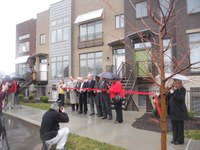
UofL officials join private developer for HSC-area residence groundbreaking (UofL Today, March 9, 2012)
- As part of our Climate Action Plan, and in line with our overarching goals of creating more vibrant, livable, walkable, bike-friendly neighborhoods around our campuses, UofL is continuing its efforts to make living close to campus an attractive option for students, faculty and staff.
- The Sustainability Council is in discussion with area developers about providing mixed-use, mixed-income, environmentally-friendly housing for employees close to campus. One such project, known as The Edge at Liberty Green, will provide such housing within blocks of our Health Sciences Center and within biking distance of Belknap Campus. Development continues on hundreds of units of various green-designed housing types and sizes for both purchase or rent. The Sustainability Council invites everyone in the UofL community to explore this exciting, new option in low-impact, healthy, urban living!
A Voice in Governance
UofL encourages employees to get involved in university-wide decision-making through a variety of channels:
- Staff Senate - Submit your comments.
- Faculty Senate
- Employee Suggestion Program - Submit a suggestion.
- Sustainability Council
Socially-Responsible Retirement Funds
UofL offers employees socially-responsible investment options for employee retirement plans. These options are designed to give you investment income for a secure retirement while putting money behind companies you can feel good about. Options include:
- CREF Social Choice Account. Investing in companies that are: strong stewards of the environment, devoted to serving local communities, committed to higher labor standards, and managed ethically. More information available online here.
- TIAA-CREF Social Choice Equity Fund. The fund's investments are subject to certain environmental, social and governance criteria. The evaluation process favors companies that are strong stewards of the environment; devoted to serving local communities; committed to higher labor standards; dedicated to producing high-quality and safe products; and those managed in an exemplary or ethical manner. More information available online here.
- Fidelity Select Environment and Alternative Energy Portfolio. Investing primarily in companies engaged in business activities related to alternative and renewable energy, energy efficiency, pollution control, water infrastructure, waste and recycling technologies, or other environmental support services. More information available online here.
To learn more, we recommend the Intentional Endowment Network's Guide to Sustainable Retirements. More information about UofL's employee benefits and our human resources policies are available here.
Preferred Name Option for Inclusion
In 2017, as part of the University of Louisville’s ongoing commitment to an inclusive and diverse environment, Human Resources and the LGBT Center expanded the use of a preferred name to employees. Similar to the option available to students since 2015, this new option allows employees to choose a preferred name that will appear in the staff directory, Blackboard, and on their campus ID card. A separate process for choosing a preferred email address (PEA) is also available to employees. Assistant Provost for Diversity and LGBT Center Director Brian Buford noted that a preferred name option promotes a climate of inclusion. “Transgender employees can be accidentally outed when the name in the system doesn’t reflect their identity. And international employees find it easier sometimes to use a name that is easier for American peers to spell and pronounce,” he said. “In both cases, it’s about removing obstacles and sending a message of inclusion.” Read more.



